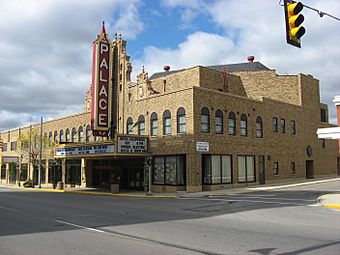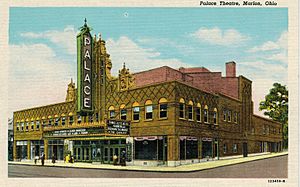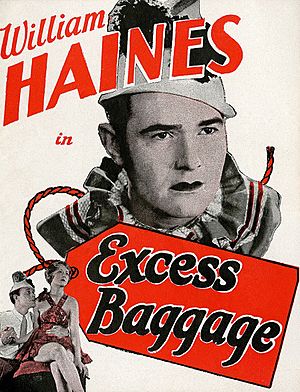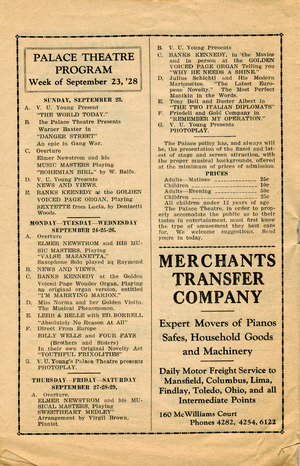Palace Theatre (Marion, Ohio) facts for kids
|
Palace Theatre
|
|

Marion Palace Theatre, Marion, Ohio
|
|
| Address | 233 West Center Street Marion, Ohio United States |
|---|---|
| Owner | Palace Cultural Arts Association |
| Type | Movie Palace atmospheric theatre |
| Capacity | 1,440 |
| Current use | Movie theatre and performing arts center |
| Construction | |
| Opened | August 30, 1928 |
| Rebuilt | 1975–1976; 2015 |
| Architect | John Eberson |
| Website | |
|
Marion Palace Theatre
|
|
| Built | 1928 |
| Architectural style | Late 19th and 20th century Spanish Revival, atmospheric theatre |
| NRHP reference No. | 76001486 |
| Added to NRHP | March 26, 1976 |
The Marion Palace Theatre is a special kind of movie theater called a movie palace. It was built in 1928 in Marion, Ohio, United States. The theater cost about $500,000 to build back then. Today, that would be like $7.5 million!
It is listed on the National Register of Historic Places. This means it's an important historical building. It's famous for its unique "atmospheric theatre" style. This style was very popular in the 1920s.
The Palace Theatre opened on August 30, 1928. It was one of the last theaters built in the atmospheric style in the United States. Besides showing movies and newsreels, it also hosted live shows. These included vaudeville acts and plays.
The theater is located on West Center Street and Campbell Street. It was built on land that used to have houses. In 1975, a group called the Palace Cultural Arts Association bought the theater. They are a nonprofit group. They fixed it up and made it new again.
Today, the Palace Theatre is still open. It shows movies and hosts many live performances. It is one of only 16 atmospheric theaters designed by John Eberson that are still used today.
Contents
Amazing Architecture
The Marion Palace Theatre was designed by John Eberson. He was a famous architect who created atmospheric theaters. The owner, V.U. Young, wanted it to look like "A Spanish Castle" or "A Palace in Old Spain."
Eberson's theaters are unique because he mixed different styles. He wanted to create a feeling, not just copy one exact style. The Palace Theatre is best described as having a Spanish Colonial Revival architecture style. This style was popular in Florida in the 1920s. It features arches, special roof tiles, towers, and balconies. It also has fancy ironwork and courtyards.
The outside of the theater looks like an old palace. Inside, you walk through a lobby and then into an arcade. This leads you to a "courtyard" area. If you sit in the balcony, it feels like you are in a Spanish town. You look down on a courtyard from a high building.
Above you, the ceiling looks like a blue sky. Stars twinkle through small holes in the plaster. A special projector, hidden in the wall, even makes clouds float across the ceiling! This makes you feel like you are sitting outdoors under the night sky.
Opening Night Fun
On August 30, 1928, the Marion Palace Theatre opened its doors. It had two shows, and both were completely full! At the first show, Colonel George B. Christian gave a speech. He talked about the history of theaters in Marion. He also praised how beautiful the new building was.
John Eberson, the architect, also spoke. He gave the owner, V.U. Young, a bag of birdseed. This was a funny gift because Eberson had put stuffed pigeons in the theater to make it feel more like being outdoors.
The entertainment started with organ music by Banks Kennedy. He was a famous organist from Chicago. He even wrote a new song for the opening called "Everybody's Welcome to the Palace." Next, the Palace Orchestra played a song.
Then, four vaudeville acts performed. These included Harry Kahne, a mental wizard, and comedy teams. After the live shows, a silent movie was shown. It was called Excess Baggage (1928 film). The theater was ready for "talkie" movies, but the sound equipment arrived the next year.
People loved the theater right away. A local newspaper, The Marion Star, described it as a "moon-lit Spanish hill" with "myriads of stars twinkling in an azure blue sky." They said it felt like a beautiful outdoor courtyard. The newspaper also noted that the balcony had no pillars, so everyone had a clear view of the stage.
Cool Statues
The feeling of being in an outdoor courtyard is made even better by the beautiful statues. These statues are placed all around the Palace. Most of them are original plaster casts made by Pietro Caproni and his company.
Caproni's company made plaster sculptures for schools, museums, and theaters across America. Eberson used them in all his atmospheric theaters. Caproni believed that good copies of art could be art themselves.
The statues at the Palace are copies of famous Greek and Roman artworks. These include the Praying Boy and Doryphoros. There is also a statue of Lorado Taft's George Washington in a balcony area.
The Theatre Organ
When the Palace opened, it had a special organ called a Page Rainbo Gold organ. It was made by the Page Organ Company in Lima, Ohio. Banks Kennedy was the first person to play it.
The Marion Star newspaper described the organ as having "exquisite tone and ornate appearance." It was custom-made just for the Marion theater. The organ's pipes are hidden on each side of the stage. The only part you can see is the console, where the organist sits. This console can even be raised and lowered!
This original organ was sold in 1976. It was replaced with a 3/10 Mighty Wurlitzer Theatre Pipe Organ. This Wurlitzer organ had been in another theater in Lafayette, Indiana, before moving to a private home. After that, it found its new home at the Marion Palace.
Restoring the Palace
The theater was fully restored between 1975 and 1976. This happened after the Palace Cultural Arts Association took over. John Eberson's son, Drew Eberson, helped guide the restoration.
During this time, the theater seats were fixed. Some were removed to make space for people using wheelchairs. The theater now has 1,420 seats. It originally had 1,540 seats.
When the theater first opened, there were shops and offices on the street level. These spaces were changed into a concession stand, a box office, and theater offices.
Since 1976, the building has continued to be improved. In 2015, work began to fix the front of the building and its signs. This included replacing bricks and terra cotta that had been damaged by water.
Theatre Archives
The Palace Cultural Arts Association keeps a small collection of items and photos from the Palace. The Marion County Historical Society also has many Palace photos and theater items. The Theatre Historical Society of America has a collection of Palace photographs too.
Hiroshi Sugimoto's Photos
The Palace Theatre is one of the movie palaces photographed by Hiroshi Sugimoto. He is a famous Japanese photographer. In 1978, he started a series called "Theatres." He would photograph old American movie palaces and drive-ins. He would open his camera's shutter for the entire length of a movie. The only light came from the film projector.
The Singin' Cowboy Premiere
The musical The Singin' Cowboy had its first-ever performance at the Palace Theatre. This happened in August 2011. It ran for six shows.
What It's Used For Now
The theater is owned by a nonprofit group. A board of directors manages it. The theater hosts a yearly season of touring artists. It also has educational theater shows for schoolchildren.
When there are no big shows, local amateur theater groups and high schools use the venue. The theater also still shows movies. It can also be rented for other events.
 | Lonnie Johnson |
 | Granville Woods |
 | Lewis Howard Latimer |
 | James West |






